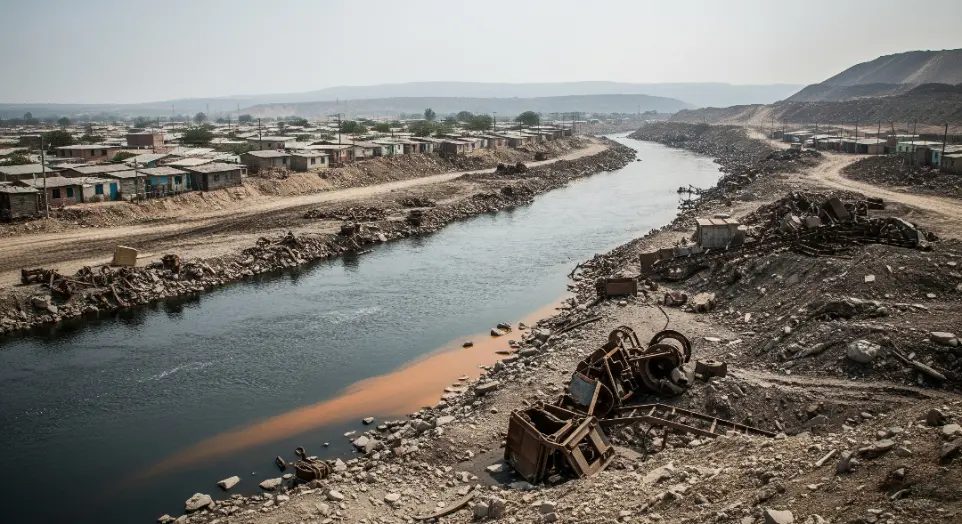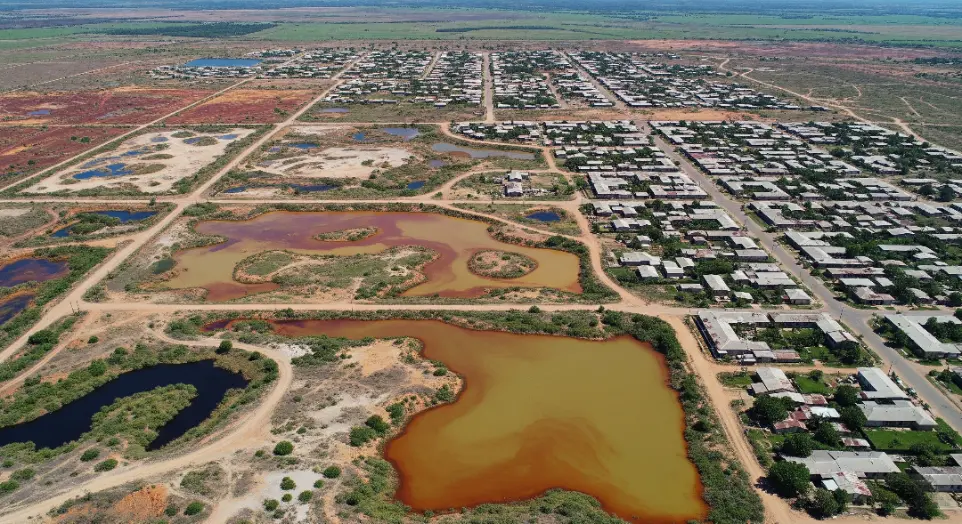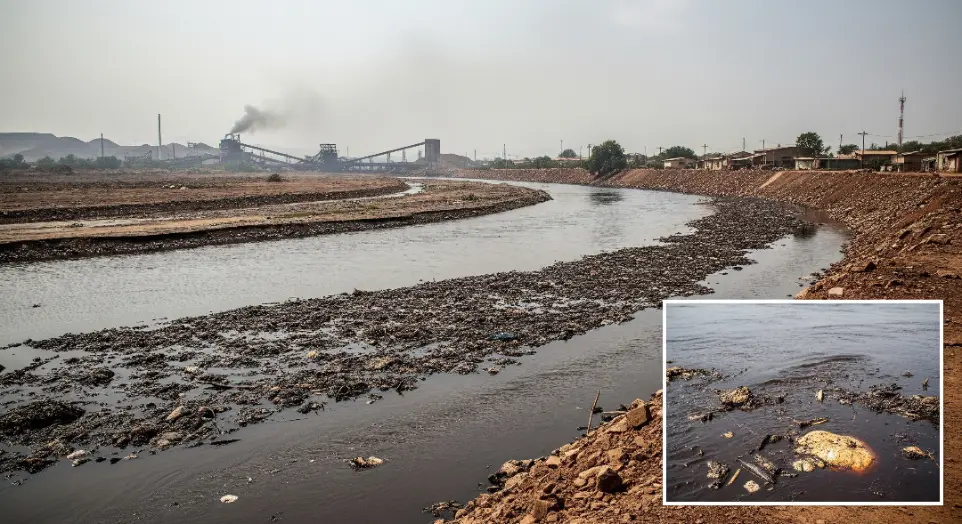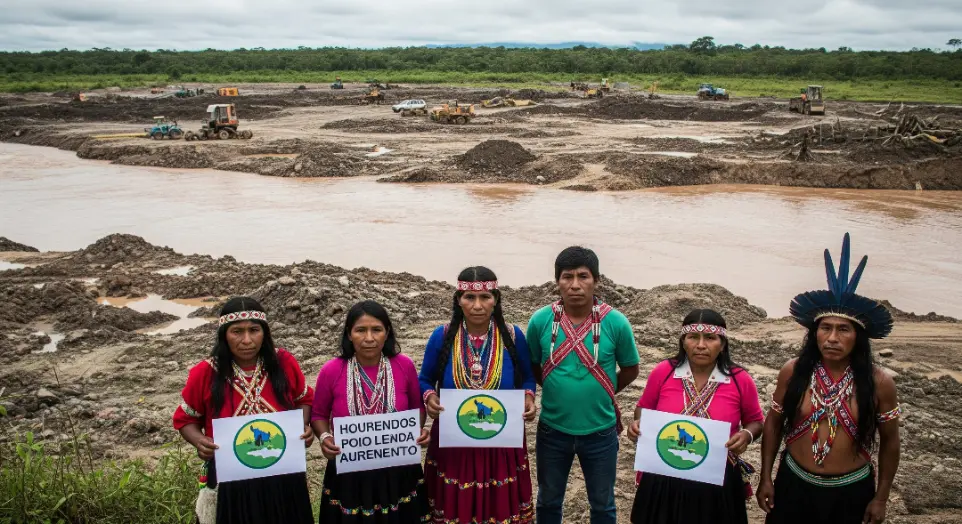Contaminated Water: The Shocking Impact of Mining on Local Communities and the Environment
Contaminated Water: The Shocking Impact of Mining on Local Communities and the Environment
The problem of water contamination resulting from mining activities has reached alarming proportions, leaving in its wake a trail of environmental devastation and profound social consequences. This phenomenon, known as mining water pollution, represents one of the greatest threats to communities near extraction sites, where water, an essential resource for life, becomes a vehicle for harm rather than sustenance.
Mining operations, which often use highly toxic chemicals such as cyanide and mercury to extract valuable minerals, have resulted in leaks, spills, and acid drainage. These hazardous elements infiltrate rivers, lakes, and groundwater, endangering not only local biodiversity but also human health and well-being. In many regions, these practices have rendered water used for human consumption and agricultural activities dangerously unhealthy, impacting both quality of life and livelihoods.
On the other hand, these harmful effects are not limited solely to the environment. They also contribute to exacerbating social and economic inequalities, as the most vulnerable communities are often the most affected by these industrial practices. Local residents often lack sufficient legal or political resources to fight against powerful mining corporations that prioritize economic profit over environmental sustainability and human well-being.
In this sense, the problem of poisoned waters transcends the merely ecological and highlights a systemic failure in the responsible management of natural resources. This opens the debate on the importance of adopting stricter regulations, investing in less invasive technologies, and promoting mining that respects human rights as well as the ecological balance of the planet.
Only through a joint and decisive effort between governments, businesses, and civil society will it be possible to stop this cycle of destruction and ensure that water is once again seen as the vital resource that unites all forms of life on our planet.
Introduction
Mining pollution is a global challenge that seriously affects populations in numerous countries worldwide. The extraction of minerals and metals, when not carried out responsibly, can have disastrous effects on the environment and the health of people living near mines. It is essential to thoroughly investigate this issue and examine its effects to understand the magnitude of its influence on communities around the world. We will discuss how mining pollution affects communities around the world, review the history and background of this issue, and highlight the need to address it urgently and effectively.
Mining pollution has devastating effects on communities worldwide, as it can damage water, soil, and air, affecting people's health, biodiversity, and the livelihoods of local communities. The release of harmful substances such as mercury, cyanide, and other heavy metals can cause serious health problems, including respiratory, skin, and nervous system diseases.
Furthermore, mining pollution can have lasting effects on food security by impairing crop quality and contaminating fish in water bodies near extraction areas. This leads to a reduction in the availability of safe and nutritious food for affected communities.
It is vital to understand that mining pollution not only harms the natural environment but also has socioeconomic effects, as it can lead to conflicts over land use, the displacement of communities, and a decline in the quality of life for those living in these areas.
Mining pollution is not a recent phenomenon and its history dates back several centuries. Over time, mining has left a legacy of environmental and social damage in different parts of the world. From the California Gold Rush to mineral extraction in Africa, the history of mining pollution has been fraught with conflict, human rights violations, and irreparable damage to the environment.
The history of mining pollution demonstrates the urgent need to address this problem comprehensively, learning from past experiences and seeking sustainable solutions that protect the environment and the rights of affected communities.
A detailed examination of the evolution of mining pollution throughout history is crucial to understand its long-term impact and establish effective strategies to prevent future environmental disasters and safeguard the human rights of vulnerable communities.
Addressing mining pollution is crucial to safeguarding the health and rights of communities around the world. Effective regulations, rigorous oversight of mining activities, and the promotion of sustainable approaches are essential to reducing the harmful effects of mining pollution.
Furthermore, it is essential to encourage the active participation of local residents in decisions involving mining that may impact their environment. Empowering these communities is vital to ensuring that their rights are respected and that measures are taken to protect their health and natural environment.
Addressing mining pollution is not limited to an environmental problem; it also has ethical, social, and human rights repercussions that require urgent and concrete global attention.
Effects of Mining Pollution on Human Health
Pollution generated by mining directly affects the health of populations living near mining sites. The presence of dust in the air, the leaching of harmful chemicals into the water and soil, and the emission of harmful gases cause serious health problems among the inhabitants of these areas. Residents frequently suffer from an increase in respiratory illnesses, skin problems, and nervous system disorders, as well as an increased incidence of cancer and reproductive difficulties.
Furthermore, prolonged exposure to heavy metals such as lead, mercury, and arsenic can have devastating consequences for children's health, causing irreversible neurological injuries and developmental disorders.
The lack of regulation and oversight in many mining areas has exacerbated this situation, making communities especially susceptible to the harmful effects on their health.
Mercury: Exposure to mercury can damage the central nervous system, impair brain function, and cause kidney problems.
Lead: Lead can cause brain damage, developmental disorders in children, high blood pressure, and kidney problems.
Arsenic: Exposure to arsenic is linked to an increased risk of skin, lung, bladder, and kidney cancer, as well as dermatological diseases and cardiovascular problems.
These are just a few examples of common contaminants present in areas impacted by mining, and their impact on people's health is significant and concerning.
According to a report by the World Health Organization, an estimated one million people die annually from diseases linked to exposure to harmful chemicals, many of which come from mining and resource extraction activities.
A significant case study is the community of Cerro de Pasco in Peru, where mining pollution has resulted in alarming rates of lead poisoning in children and chronic health problems in adults. These situations highlight the urgent need to establish stricter regulations and protective measures for communities affected by mining pollution.
Mining pollution in communities around the world is a serious issue that requires effective preventive actions and measures. One of the key actions is to establish stricter laws to oversee mining activities and reduce their impact on the environment. This includes creating stricter requirements for waste management, water control, and post-mining land reclamation.
Likewise, it is important to promote clarity and accountability in the mining sector, ensuring that companies assume responsibility for their impacts on the environment and society. Affected communities must have a voice in decision-making and be meaningfully consulted before permits are granted for mining projects in their areas.
Other preventive actions include encouraging cleaner and more sustainable technologies in mineral extraction and processing, as well as strengthening citizen participation in the oversight and control of mining activities to ensure compliance with environmental standards and the protection of human rights.
Socioeconomic Impact on Affected Communities
Pollution caused by mining has led to the displacement and forced relocation of entire communities in various parts of the world. Mining activities often require vast areas of land, resulting in the expulsion of local communities from their homes and historical lands. This forced displacement not only impacts the people involved emotionally and culturally but also leads to the loss of their traditional livelihoods. Forced relocation can create tensions and conflicts with other communities, further worsening the situation.
Furthermore, relocating communities can result in the loss of access to essential natural resources, such as drinking water, fertile land, and grazing areas, negatively impacting the food security and overall well-being of displaced people. The lack of free, prior, and informed consultation with these communities intensifies the injustice of this situation, affecting their basic human rights. It is important to understand that the displacement and relocation of communities due to mining pollution not only represents a human rights violation but also has a profound and lasting impact on the lives of those affected.
Mining pollution has devastating effects on the economy of surrounding communities. Environmental degradation, water and soil contamination, and the loss of biodiversity have a direct impact on traditional economic activities, such as agriculture, fishing, and livestock. These activities, which are often the foundation of the economy in the region, are severely affected, resulting in a decrease in food production and a loss of income for families.
Additionally, mining pollution can hinder the growth of new businesses and the attraction of investment in the area, negatively impacting job creation and economic opportunities for future generations. The quality of life declines, healthcare costs increase, and disposable income is reduced, constituting some of the negative economic effects faced by communities affected by mining pollution.
It is essential to recognize that the impact on the local economy goes beyond economic losses; it involves the disruption of the social fabric and the deterioration of community well-being, highlighting the urgent need to address this problem from a comprehensive perspective that prioritizes respect for and protection of human rights.
Pollution caused by mining causes serious social and political problems in affected communities. The struggle to access and control natural resources, as well as disputes over compensation and the search for justice and accountability, are just some of the sources of conflict that emerge in this context.
In turn, the arrival of mining companies can divide the community, creating a confrontation between those seeking economic gain and those seeking to protect the environment and human rights. These disagreements can intensify, leading to situations of violence, repression, and the criminalization of those who defend human rights and the environment.
Social and political problems related to mining pollution threaten community unity, peace, and stability, and require comprehensive responses that address the root causes of these conflicts and foster inclusive and just solutions.
The way governments and mining companies respond to mining pollution in communities around the world is a very important human rights issue. Affected communities often face significant obstacles when seeking support and attention from authorities and responsible companies. Mining companies' initial response may often be to deny or minimize the impact of their activities, further exacerbating the situation for affected communities.
On the other hand, government responses can vary greatly across countries. Some governments have strict regulations and mechanisms to oversee mining activity and protect the rights of local communities. However, in other cases, corruption, lack of law enforcement, and conflicts of interest can lead to an insufficient or even negligent response by authorities.
It is essential that mining companies take responsibility for their activities and take concrete actions to reduce and repair the damage caused by pollution in communities. This involves using cleaner technologies, actively participating in consultations with affected communities, and offering fair compensation for the damage caused. Governments also have a duty to ensure compliance with environmental regulations and protect the human rights of communities impacted by mining.
International Regulations and Legal Framework
Mining-related pollution is considered a global challenge that impacts many communities around the world. To address this problem, several international regulations and agreements have been created to regulate mining activities and safeguard the environment, along with the rights of affected communities.
Among the most notable regulations are the Minamata Convention, which addresses mercury, and the Basel Convention, which regulates the movement and disposal of hazardous waste. They also include guidelines from the International Labor Organization and principles established by the International Court of Justice.
These regulations aim to establish standards for waste management, the protection of natural resources, and the inclusion of communities in decisions that impact their environment, in order to prevent and control pollution from mining.
The issue of mining pollution highlights the need to clarify the roles and responsibilities of governments and mining companies in preventing and reducing environmental and social impacts. Governments must create and enforce effective regulations, supervise mining activities, and ensure access to justice for affected communities.
For their part, mining companies have an obligation to operate responsibly, complying with international regulations and standards, and assume responsibility for the harm they cause. Furthermore, companies are expected to involve communities in the decision-making process and support sustainable development within the areas where they operate.
Proper fulfillment of the roles and responsibilities of both governments and companies is essential to comprehensively address the problem of mining pollution and protect the rights of affected communities.
Despite established international regulations and responsibilities, the implementation and enforcement of mining pollution standards face several obstacles. These problems include a lack of technical capacity and financial resources in governments, excessive influence of mining companies in policymaking, and weak national laws to enforce international regulations.
Furthermore, the lack of clarity and accountability in the mining sector, along with limited community involvement in decision-making, contributes to the continued pollution caused by mining and its harmful effects. Addressing these problems requires a strong commitment from governments, companies, civil society, and the global community to ensure effective enforcement of regulations and protect human rights in relation to mining activities.
Actions and Movements for the Protection of Human Rights
In the battle against mining pollution and its impact on communities, several groups and advocates have been essential in protecting human rights. Among these are Amnesty International, Greenpeace, and Earthjustice, which have fought to safeguard communities harmed by mining pollution around the world. These organizations have worked hard to raise awareness about the human rights violations caused by mining pollution, pressuring governments and companies to take responsibility.
Likewise, local advocates in impacted areas have led movements of resistance and human rights protection, raising their voices to demand justice and concrete actions to reduce the harmful effects of mining pollution in their communities. These courageous individuals have been key in making the harmful effects of mining visible and promoting sustainable solutions.
Cooperation between these groups and local advocates has strengthened the defense of human rights in the context of mining pollution, having a significant impact on public awareness and government policies at both the national and international levels.
Protection and assistance tactics for communities affected by mining pollution have ranged from legal action to awareness-raising campaigns and direct aid to victims. Organizations such as EarthRights International have provided legal advice and representation to affected communities, seeking justice through judicial systems at different levels.
In addition, psychological and medical support programs have been created to address the mental and physical health needs of those suffering from mining pollution. These initiatives have been led by both local groups and international organizations, recognizing the need to comprehensively address the impacts of pollution on the health and well-being of communities.
Awareness-raising campaigns have also been implemented to educate the public about the dangers of mining pollution and mobilize support for affected communities. These initiatives have used various formats, including peaceful protests, documentaries, investigative reports, and media coverage, with the aim of pressuring mining companies and governments to assume their responsibilities.
International pressure has played an important role in protecting communities affected by polluting mining. Global attention and criticism have fostered the creation of stricter standards for mining activities and clarified the responsibilities of companies involved in these operations.
Global scrutiny has led to greater analysis of how mining companies manage human rights and the environment, resulting in the adoption of stricter accountability policies. Furthermore, global pressure has helped recognize more effective operating practices and standards that seek to prevent pollution and safeguard the rights of local communities.
On many occasions, global pressure has led to significant changes, such as compensation for affected communities, the implementation of actions to repair environmental damage, and the strengthening of community involvement methods in decisions related to mining.
Conclusions
The challenges ahead regarding mining pollution and its impact on communities are significant. Communities affected by this situation continue to defend their essential human rights, including access to clean water, clean air, and a healthy environment. It is crucial that stricter regulations be established to control mining activity and that strict sanctions be applied to companies that do not comply with relevant environmental standards.
It is also very important that comprehensive environmental impact studies be conducted before any mining project is approved. These assessments must involve the active participation of local communities, ensuring that their concerns are heard and their rights are adequately protected.
Regarding potential solutions, it is essential to promote the use of greener technologies and responsible practices in mineral extraction and processing. Investing in research and development of sustainable mining methods is essential to minimize damage to the environment and nearby communities. It is also vital that mining companies be transparent and accountable to ensure respect for human rights and environmental protection in mining areas.
The devastating effects of mining pollution on communities must not be ignored, and there needs to be a global call to action. Raising awareness on this issue is key to mobilizing governments, international organizations, businesses, and civil society to find effective solutions. Sharing accurate and up-to-date information about the consequences of mining pollution on communities is crucial to achieving meaningful change.
Furthermore, it is vital to engage citizens and consumers in promoting ethical mining practices. This can be achieved through awareness-raising campaigns, boycotts of companies that do not comply with environmental standards, and lobbying governments to implement stricter regulations. Global solidarity with communities affected by mining pollution is essential to ensure their voices are heard and that concrete actions are taken to address this problem.
Combating mining pollution and its impact on communities requires a comprehensive approach that includes regulation, technological innovation, global awareness, and the defense of human rights. Only through a joint international effort can we move toward a future in which mining is compatible with respect for human rights and environmental conservation.




Pollution generated by mining activities continues to be a challenge that harms numerous communities in various corners of the planet, and its importance in the current context cannot be overlooked. It is crucial to pause and analyze the consequences of our actions on the environment and commit to implementing concrete solutions to safeguard those who suffer the effects of this problem. We all have the capacity to contribute to positive change that benefits the entire world.

 IHRO NEWS
IHRO NEWS